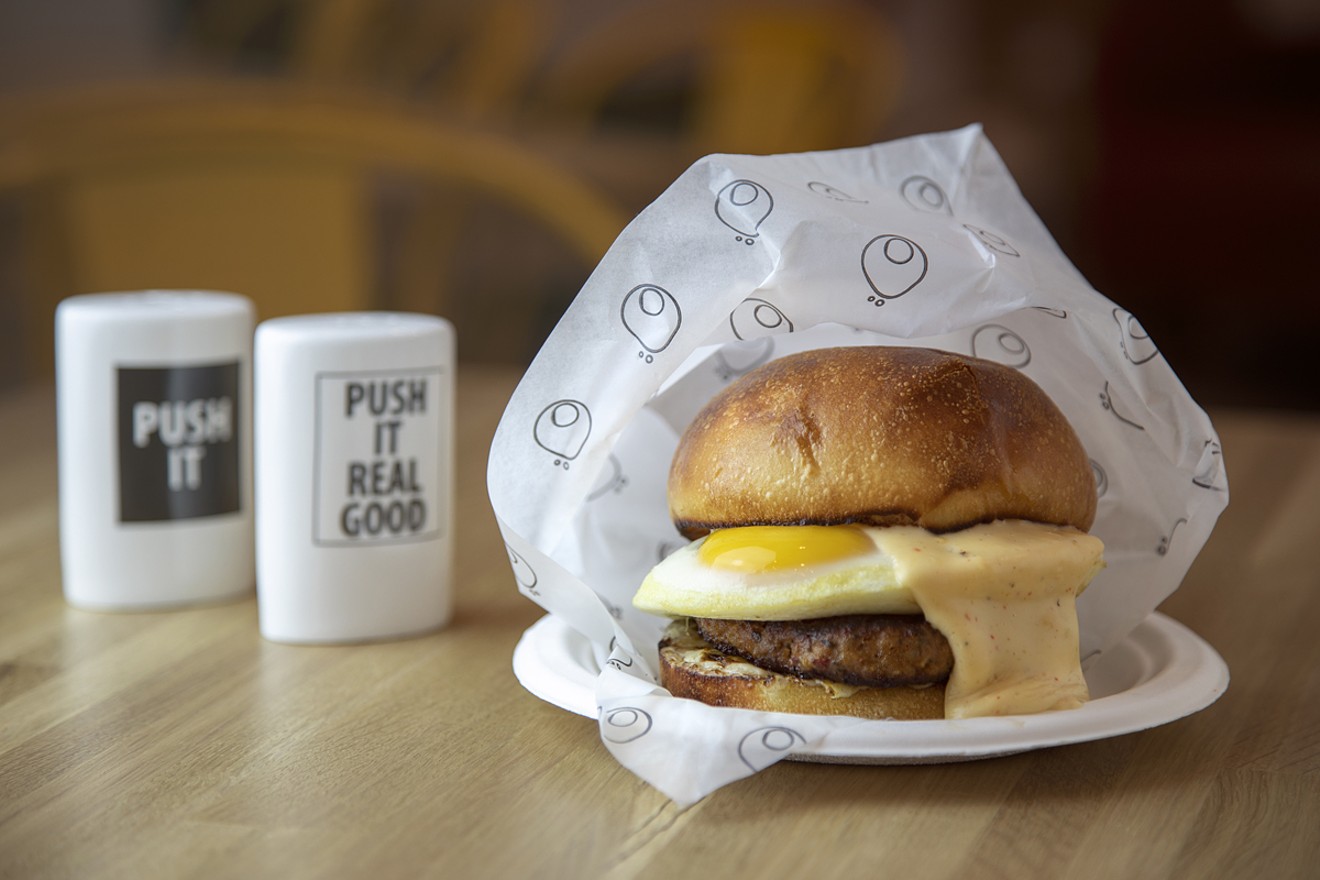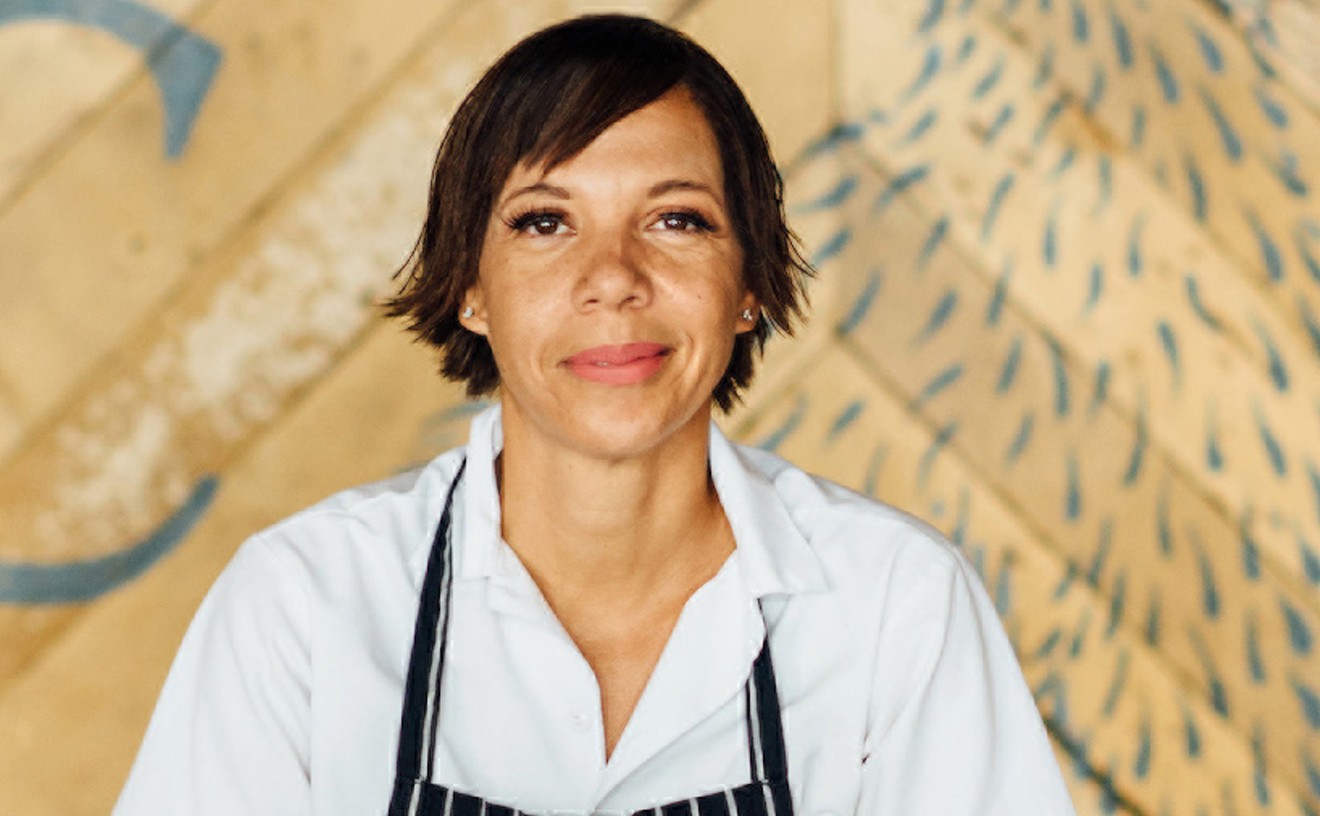Michael Lewis never wanted to open a casual restaurant; he just wanted something to eat. Most days he arrived early at Kyu, his Asian barbecue spot in Wynwood famed for its cauliflower, to prepare the kitchen for the looming onslaught. After four or five hours, he was famished, breakfast had long finished, and, as most cooks will attest, you can eat your own food only so often.
"My partner Steve and I thought somebody should open an all-day breakfast place — we know we'd eat there a few times a week," Lewis says. "Then we kind of looked at each other in this funny ta-dah moment and said, 'We do restaurants. We can do that.'"
They soon took over the space that housed Philadelphia restaurateur Michael Solomonov's Dizengoff and Federal Donuts, knocked down the wall separating the two, and reskinned it with a carefree white and raw-wood palette that makes it welcoming but not overstimulating for the early-morning crowd.
The menu at Laid Fresh (250 NW 24th St., Miami; 305-699-0601; laidfresh.com), which opened last month with a concise list of egg sandwiches in various formats plus a fierce Buffalo fried chicken sandwich ($11), is more complex than it seems.
"Simple isn't always easy, and it often translates to something much harder," Lewis says. "When you're talking about using only three or four ingredients, they each have to be delicious, they each have to be cooked and seasoned properly, and if one of them is off, the whole thing is off."
Perhaps the greatest test of that is the sausage and egg sandwich ($9). Bookended by a housemade potato bun that combines the puffy delight of a potato roll and the rich, airier crumb of brioche, it holds a fried egg (the only acceptable form of egg in a sandwich) and housemade sausage designed to mimic Jimmy Dean sans nitrites, made with the shoulders and bellies of North Carolina-grown Cheshire pigs. The American-cheese sauce recalls Cheez Whiz but is punched up with fontina, Parmesan, and a few other ingredients to "make it sexy," Lewis says. Indeed, the way it clings to your lips, your fingers, and your shirt if you're not careful can have an erotic appeal to the right kind of mind.
The spread of the city's best cooks into other price points is the best thing happening in 2019.
tweet this
Is it the city's best breakfast sandwich? Maybe. But more important, it's a totem of a movement in which many of Miami's best chefs are creating a parallel track for their cuisine that gives diners a chance to enjoy better dishes without forking over in excess of $150 for two people and a few hours of an evening. Such is the case at the recently opened Time Out Market, which promises meals around $20 from favorites such as Phuc Yea and Ariete, whose chef/owner, Michael Beltran, also opened the reasonably priced Cuban diner Chug's in Coconut Grove. In downtown Miami, Danny Serfer, who will gladly serve you caviar and $100 raw-seafood platters at Mignonette, will soon launch the sub shop Vinaigrette, while nearby, Francisco Abenante, the celebrated chef behind Caracas' Casa Bistro, is set to open an arepa spot later this year.
While recent headlines have been aflutter with news of this-and-that Michelin-starred chef thrusting a flag into the sand, the slow spread of the city's best cooks into other avenues and price points is far and away the best thing happening in 2019.
Take, for instance, Pho Mo, the Vietnamese soup stand from Phuc Yea's Cesar Zapata and Aniece Meinhold that recently opened inside Time Out Market. The two have been among the most high-profile purveyors of Vietnamese cuisine since they started out as a pop-up in downtown Miami in 2011. Their temporary restaurant has settled into a permanent home on Biscayne Boulevard, and the pair worked to ensure it never becomes a pho house.
"We want people to be trying new things, to be eating seafood with their fingers, the kind of Vietnamese food you find in Houston," Meinhold says. Yet they never strayed too far from their soup and have spent the past year perfecting a delicate blend of beef bones, roasted onion, and ginger perfumed with the sweet, spicy aromas of cinnamon and star anise.
Though Time Out Market has been open nary a month, Pho Mo seems to be among the most popular stands, with a troupe of cooks scrambling to dish out no fewer than a dozen orders of soup at a time. Of course, there's the classic pho bo ($15), anointed with fatty brisket and top round plus squeaky, addictive beef balls. The pho ga ($15) is a more delicate, though no less assertive, affair thanks to a slick of lemongrass chili oil.
Like Lewis' Laid Fresh, the success of a concept with a tight menu depends on everything being executed almost perfectly. It's a way for Zapata and Meinhold, who at Phuc Yea limited the varieties and availability of their pho, to bring more soup to the masses for a longer period of time. So they've spent the past two years offering soup for lunch and delivery, all while tweaking the recipes so cooks can prepare 50-gallon batches that hold true to the flavors Meinhold grew up with when her grandmother, whom everyone called Ba Ni, would make soup for the family.
Many of these more casual spots hark back to childhood memories. When Michael Beltran opened Coconut Grove's Ariete in early 2016, he was fresh off a three-year stint at Michael Schwartz's now-closed fine-dining spot where he, Roel Alcudia, and a small team turned out some of the city's most precise food. At Ariete, his first restaurant as an owner, Beltran bore high expectations of himself and an insatiable appetite. The combination led the now-33-year-old to turn out ambitious plates with wisps of Cuba, such as a hulking smoked pork chop with grilled ramps and romesco, and foie gras with cacao nibs, fried plantains, a hint of vinegar, and a caramel sauce. Though his food has shifted somewhat over the past year or so to include more vegetable cookery, Beltran has always nursed a love for the simple Cuban food he grew up with.
"I wanted to be able to feed people in the morning, all day and every day," he says. "I'm a cook — that's what I love to do."
So whereas at Ariete you might spend $40 to $70 for dinner and wine, at Chug's, his Cuban diner in Coconut Grove, you can get one of "Abuela's plates" with mojo roast pork ($9.99) or fried fish ($14.99) for lunch or an early dinner with ingredients far superior to those at Versailles or one of the countless Latin American cafés strewn across town.
"It comes with my grandmother's black beans, my grandmother's white rice, and half a banana, which is what I got when I was a kid," Beltran says. "Just because we do much more simple food doesn't mean it's a cop-out. If anything, we're trying to change the dynamic and the conversation about this style of food."
It's welcome news. A recent report from Apartment List shows Miami has the sixth-highest income inequality among the nation's largest metro areas, with a wealth gap that jumped 7.5 percent between 2008 and 2017. While the skyline fills with condos built for billionaires, the city's poor struggle to find affordable housing that doesn't devour the lion's share of their monthly income. Another report, released earlier this month by the City of Miami and the nonprofit Miami Homes for All, which works to combat homelessness, says 71 percent of Miami households are renters, and 61 percent spend more than 30 percent of their income on housing. To combat the problem, the city would need to construct an additional 50,000 housing units.
The $20 price point toward which many of these chefs are moving is an admirable step, but the stark reality seems to be that most of the people paying attention to food are of a privileged class that's one or many steps removed from the existential crisis in which most of the city lives. Nevertheless, access to well-made, wholesome food — not feedlot beef and Roundup-doused produce — ought to be available to everyone, not just those who can handle developers' legal work at a rate of $600 an hour.













